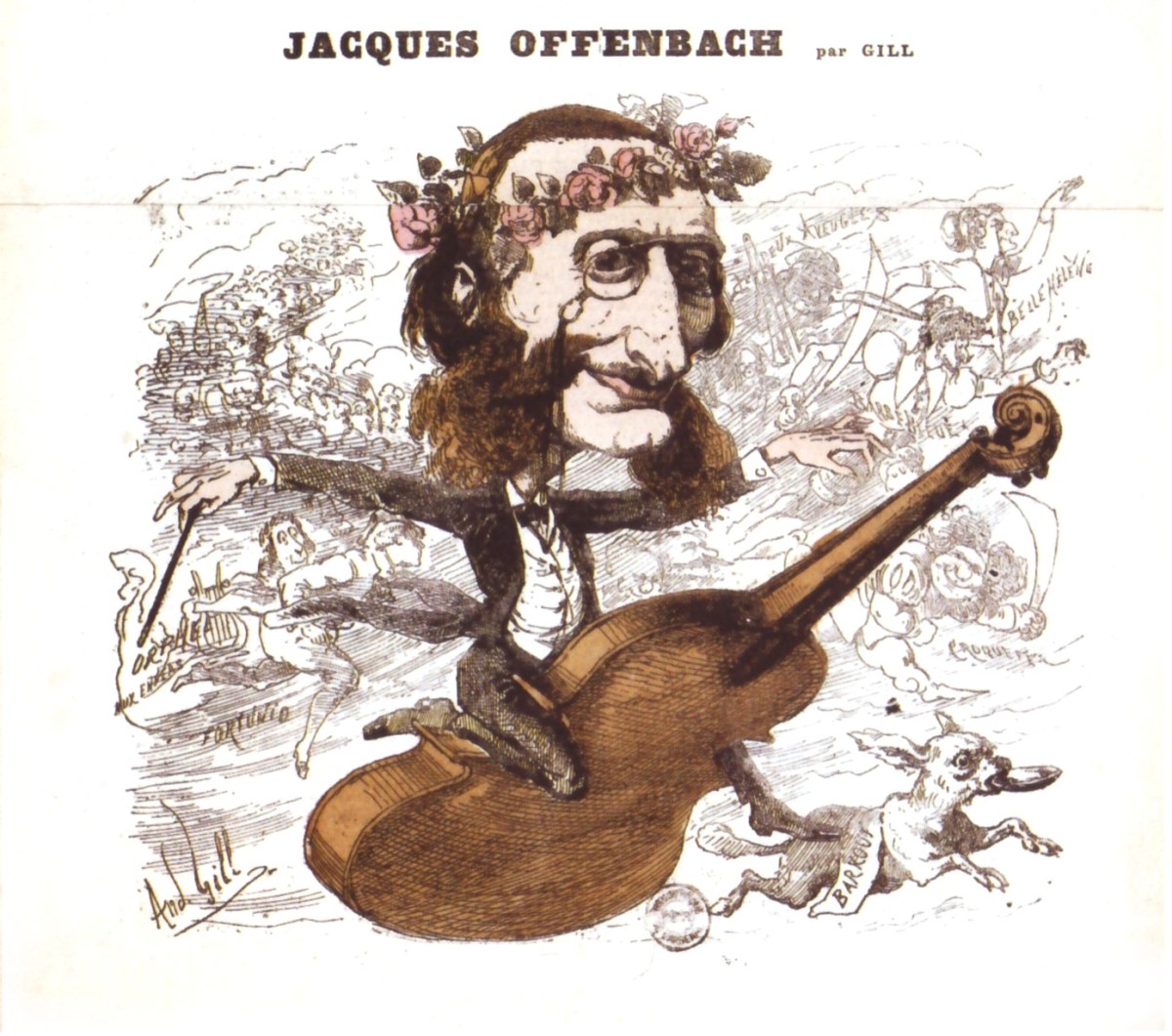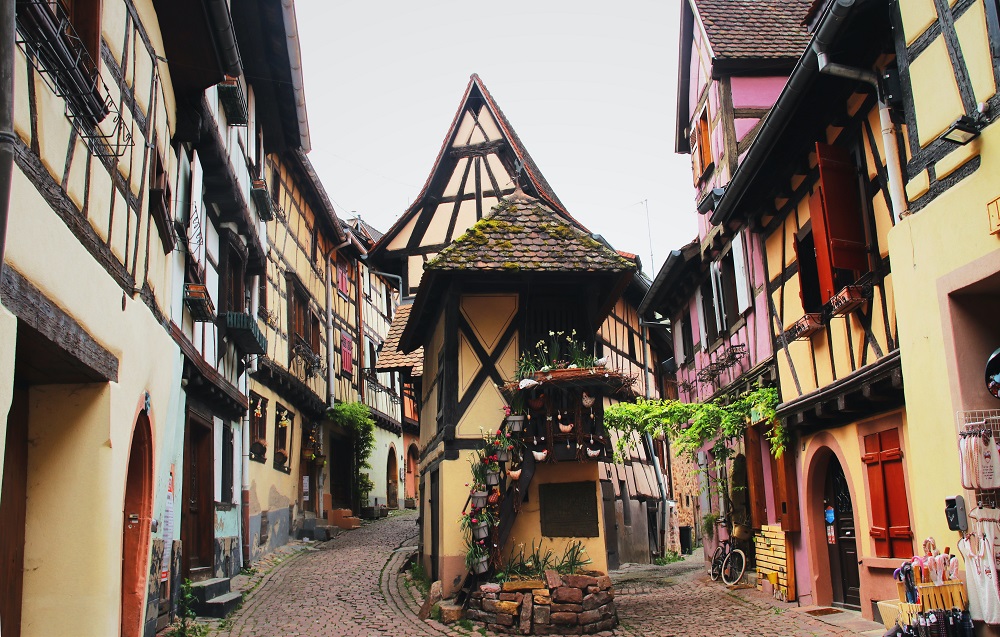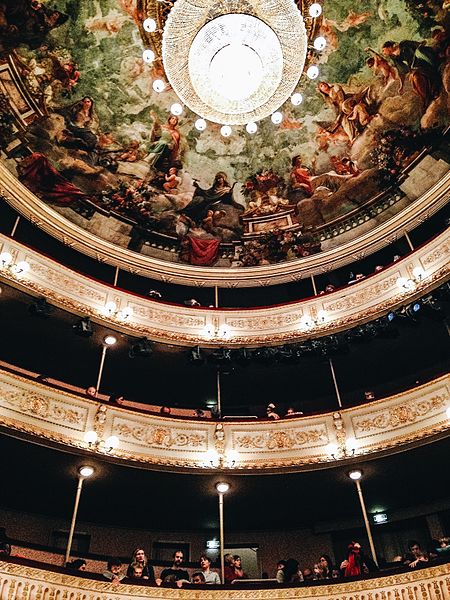Chris Weber
Operetta Research Center
15 December, 2022
If resources enough could be gathered together for an annual festival of Offenbach and maybe his time, where would it be held?

Jacques Offenbach photographed by Nadar in the 1860s.
Rossini and Donizetti aficionados solve that problem by putting their festivals in the birthplace of their composers. But both of them are so very tied to those places. Well, Donizetti more than Rossini; the former both was born and died in Bergamo, which happens to be a pretty wealthy Northern Italian city.
Rossini’s birthplace in Pesaro is on the Adriatic Sea and a resort which perfect for the summer shows it has put on for around 40 years now.
Wagner had a special theatre built in Bayreuth for this exact purpose, and no one was going to argue that it should not be in Germany: German and Wagner are tied together in a way that few other composers are.

Jacques Offenbach riding his success, a caricature from a Paris newspaper.
But what to do with a “German-Jewish French Roman Catholic”? Born in Cologne, which was in 1819 part of Prussia, it is almost a sick joke to try to tie him to that place, which has been called ‘not a country with an army, but an army with a country’. (Of course, modern Cologne may not be as charming, but it has lost all its ties to Prussia.)
He high-tailed it to Paris as soon as he could, and stayed there until the disastrous defeat and humiliation of the 1870/71 war and Commune made him leave. He would have been strung up had he stayed, as a hated German. And in fact he read the writing on the wall even before the Franco-Prussian War began. His wife being Spanish, he sat out that horror mostly in San Sebastian. One can say that he went where he was wanted, whether that was London, Vienna, Italy, or even Philadelphia.
In fact, he was the most cosmopolitan composer of his age. The rising tide of nationalism had no attraction for him: he had bigger fish to fry. Humanity was his audience, or rather that happy segment of it which – then as now – values his inimitable brand of wit and joy.
We are fortunate to have a modern Europe less tied to nationalism than at any time in its bloody history. Tied together with the first common currency since the gold standard ended in 1914, travel throughout is also cheaper and easier than ever before.

Sheet music cover for “Le pont des soupirs.” (Photo: Archive Kurt Gänzl)
At the moment we have to leave Russia out of the picture, which is a shame: that nation loves Offenbach. Once I was vexed in Soviet Moscow by having to choose between performances of Hoffmann at the Bolshoi and “The Bridge of Sighs” (Le Pont des Soupirs is yet another of his too-rarely-performed jewels) at their Operetta Theatre (and how many cities have that, outside of Eastern Europe?). Of course, I choose the rarer piece. Thus, I can say that I saw Soupirs at the two farthest outposts of this type of modern musical pleasure; the other being San Francisco’s Pocket Opera, which in the 1980s and 90s put on countless works by Offenbach (and Lecocq’s Madame Angot).
So where to put an Offenbach festival? It could be like the Olympics and move from place to place. And why not: the peak of sport moves around to those who want to sponsor it, so why shouldn’t also the peak of musical happiness (especially in this world which isn’t exactly brimming over with that emotion, musical or any other kind).

Beautiful Alsace. (Photo: Iga Palacz / Unsplash)
The long-fought-over province of Alsace springs to mind. Home to the best aspects of both France and Germany, one can see why it has been fought over. Today, with modern Europe, Alsace retains is peculiar charm. Food, wine, buildings, people… all have that wonderful combination of the two civilizations. While Strasbourg is the capital, I would zero in on Colmar as the single most Alsatian of towns. It has a lovely Théâtre Municipal (located on 3, Rue des Unterlinden, I kid you not).
Dating from 1849, it could well have housed Offenbach’s “Alsatian operetta”, the one-act Lischen et Fritzchen. It used to seat 750, but due to recent renovation to make it more comfortable, now seats 550. That to me is a perfect size for these works; no one is far away from the stage.
Sadly, I’ve never been inside, but it does look wonderful on photographs.

The Théâtre municipal de Colmar. (Photo: ALINE COCO 67 / CC BY-SA 4.0)
The only possible drawback one could find with this otherwise perfect location is that the very pretty town is overwhelmed by mostly German tourists for much of the year. There are lovely hotels (we always stay at the 4 star Hôtel Le Maréchal, on the canal, where every room is named for a composer; as I recall, no. 27 is Offenbach- not one of their most prestigious, we’re sorry to report ).
But Colmar is often full; one has to be careful not to be shut out; less-pretty Mulhouse is not all that far to the south.
After all the wars, Colmar is today clearly French, but nearly everyone speaks German and English (more the former than the latter, since that is where the money comes from).

Downtown Biel/Bienne. (Photo: Claudio Beck / Unsplash)
If not Colmar, then there is the Swiss town I visited almost by accident: Biel/Bienne. It is the world’s largest bilingual town, with 60 percent of it roughly 100,000 people German-speaking and 40 percent French, and most everyone speaking both, and English as well.
It has a small theatre: a normal-sized orchestra pit and stage and seats for only 260, with every one of them putting you into directly into the action, drama, or comedy.
It is a ‘working class’ Swiss city, with the components for watch-making providing jobs for generations. The “Rolex” building stands out. Maybe Rolex could be a sponsor? Or any number of any other watchmakers?
The old town, where the theatre is, has an atmosphere of having escaped the insanity of the 20th century. No wars have marred its cobblestones and J.O. could easily have trod upon them.
A mere 20 miles (25 km) away is neighbor Soloturn. It has another small horse-shoe shaped theatre that is actually one ‘rang’ higher than Biel’s’.
Certainly, Cologne and Paris have the money and the more obvious ties to J.O.
But if I had the money and influence, if Colmar fell through for any reason, I’d investigate these two Swiss ‘sister towns’. Maybe there’d be no interest, but it’s not as if other festivals are crowding out a potential Offenbachiana. And no place on earth would be closer to a Franco-German atmosphere, with both languages flourishing side by side, and everyone speaking English on top of that.
In any case, it is nice to let the mind wander on this. It may not happen in our lifetimes, but it is pleasant to dream, and to visit corners of Europe which have escaped the insanity of the years since 1870 (if you set early-1945 Colmar aside; in brief but bloody action, 8,000 Americans were killed or wounded taking this “Colmar Pocket” back, with four times as many German casualties).

“Die neuesten Noten des Herrn Jacques Offenbach,” i.e. the latest compositions from Mr. Jacques Offenbach. From: Kikeriki, 1865.
So Colmar, Biel/Bienne, or Soloturn: three small, charming, and cosmopolitan places where it would be a pleasure to spend a few days each year, hearing some of the most pleasurable music ever written.
